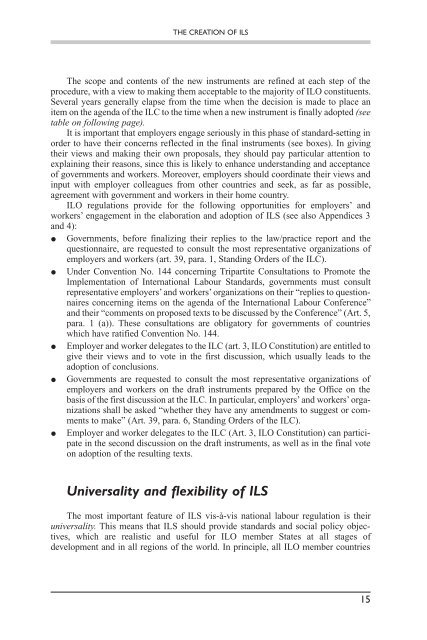Employers' Handbook on ILO Standards-related Activities
Employers' Handbook on ILO Standards-related Activities
Employers' Handbook on ILO Standards-related Activities
Create successful ePaper yourself
Turn your PDF publications into a flip-book with our unique Google optimized e-Paper software.
THE CREATION OF ILS<br />
The scope and c<strong>on</strong>tents of the new instruments are refined at each step of the<br />
procedure, with a view to making them acceptable to the majority of <strong>ILO</strong> c<strong>on</strong>stituents.<br />
Several years generally elapse from the time when the decisi<strong>on</strong> is made to place an<br />
item <strong>on</strong> the agenda of the ILC to the time when a new instrument is finally adopted (see<br />
table <strong>on</strong> following page).<br />
It is important that employers engage seriously in this phase of standard-setting in<br />
order to have their c<strong>on</strong>cerns reflected in the final instruments (see boxes). In giving<br />
their views and making their own proposals, they should pay particular attenti<strong>on</strong> to<br />
explaining their reas<strong>on</strong>s, since this is likely to enhance understanding and acceptance<br />
of governments and workers. Moreover, employers should coordinate their views and<br />
input with employer colleagues from other countries and seek, as far as possible,<br />
agreement with government and workers in their home country.<br />
<strong>ILO</strong> regulati<strong>on</strong>s provide for the following opportunities for employers’ and<br />
workers’ engagement in the elaborati<strong>on</strong> and adopti<strong>on</strong> of ILS (see also Appendices 3<br />
and 4):<br />
l Governments, before finalizing their replies to the law/practice report and the<br />
questi<strong>on</strong>naire, are requested to c<strong>on</strong>sult the most representative organizati<strong>on</strong>s of<br />
employers and workers (art. 39, para. 1, Standing Orders of the ILC).<br />
l Under C<strong>on</strong>venti<strong>on</strong> No. 144 c<strong>on</strong>cerning Tripartite C<strong>on</strong>sultati<strong>on</strong>s to Promote the<br />
Implementati<strong>on</strong> of Internati<strong>on</strong>al Labour <strong>Standards</strong>, governments must c<strong>on</strong>sult<br />
representative employers’ and workers’ organizati<strong>on</strong>s <strong>on</strong> their “replies to questi<strong>on</strong>naires<br />
c<strong>on</strong>cerning items <strong>on</strong> the agenda of the Internati<strong>on</strong>al Labour C<strong>on</strong>ference”<br />
and their “comments <strong>on</strong> proposed texts to be discussed by the C<strong>on</strong>ference” (Art. 5,<br />
para. 1 (a)). These c<strong>on</strong>sultati<strong>on</strong>s are obligatory for governments of countries<br />
which have ratified C<strong>on</strong>venti<strong>on</strong> No. 144.<br />
l Employer and worker delegates to the ILC (art. 3, <strong>ILO</strong> C<strong>on</strong>stituti<strong>on</strong>) are entitled to<br />
give their views and to vote in the first discussi<strong>on</strong>, which usually leads to the<br />
adopti<strong>on</strong> of c<strong>on</strong>clusi<strong>on</strong>s.<br />
l Governments are requested to c<strong>on</strong>sult the most representative organizati<strong>on</strong>s of<br />
employers and workers <strong>on</strong> the draft instruments prepared by the Office <strong>on</strong> the<br />
basis of the first discussi<strong>on</strong> at the ILC. In particular, employers’ and workers’ organizati<strong>on</strong>s<br />
shall be asked “whether they have any amendments to suggest or comments<br />
to make” (Art. 39, para. 6, Standing Orders of the ILC).<br />
l Employer and worker delegates to the ILC (Art. 3, <strong>ILO</strong> C<strong>on</strong>stituti<strong>on</strong>) can participate<br />
in the sec<strong>on</strong>d discussi<strong>on</strong> <strong>on</strong> the draft instruments, as well as in the final vote<br />
<strong>on</strong> adopti<strong>on</strong> of the resulting texts.<br />
Universality and flexibility of ILS<br />
The most important feature of ILS vis-à-vis nati<strong>on</strong>al labour regulati<strong>on</strong> is their<br />
universality. This means that ILS should provide standards and social policy objectives,<br />
which are realistic and useful for <strong>ILO</strong> member States at all stages of<br />
development and in all regi<strong>on</strong>s of the world. In principle, all <strong>ILO</strong> member countries<br />
15

















